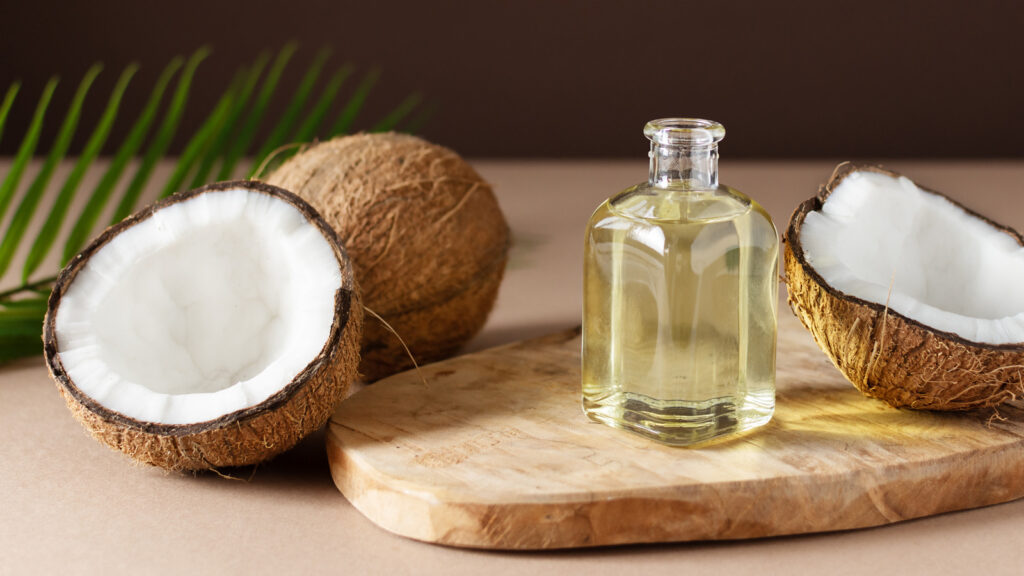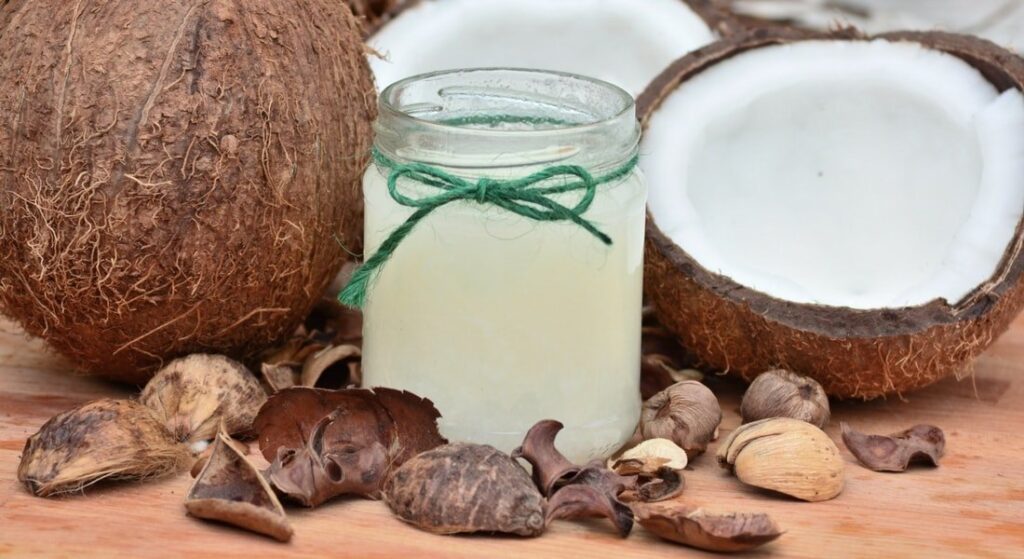It was a sunny day in my kitchen, and I wanted to use coconut oil. But when I opened the jar, instead of the usual liquid, it was solid! It left me wondering, “Can coconut oil change like this at room temperature?”
If you’ve had a similar coconut oil surprise, you’re not alone. Coconut oil is a bit like magic. It can be solid or liquid, and it all depends on the room’s temperature.
Yes, coconut oil can solidify at room temperature. Coconut oil’s behavior at room temperature is influenced by its unique composition. It contains a high percentage of saturated fats, primarily lauric acid, caprylic acid, and capric acid. These fatty acids have different melting points, with lauric acid solidifying at around 76°F (24°C), which is typical room temperature. When the surroundings are cooler than this, coconut oil solidifies into a white, creamy consistency.
However, when the temperature rises above its melting point, typically in warm environments, coconut oil transforms into a clear, liquid state. This versatility makes coconut oil a popular choice for various applications, from cooking to skincare, and showcases its adaptability to environmental changes.
What Is Coconut Oil?

Coconut oil is a versatile and edible oil extracted from the meat or kernel of coconuts, the large seeds of the coconut palm (Cocos nucifera). It is composed mainly of saturated fats and is known for its unique combination of fatty acids. The predominant fatty acid in coconut oil is lauric acid, followed by caprylic acid and capric acid.
Coconut oil is notable for its various uses and potential health benefits. It is utilized in cooking, baking, and frying due to its high smoke point and pleasant coconut flavor.
Additionally, coconut oil has gained popularity in the beauty and skincare industry for its moisturizing and nourishing properties. Some of its potential health benefits include supporting heart health and aiding in weight management.
Coconut oil’s versatility and potential health benefits have made it a staple in many households and a sought-after ingredient in various culinary and cosmetic products.
Does Coconut Oil Solidify at Room Temperature?
The Solid State: Coconut Oil’s Low Melting Point
When we talk about coconut oil solidifying, we’re essentially discussing its transition into a solid state. This transformation occurs when the temperature drops below a critical threshold – the melting point of coconut oil. And that magic number is approximately 76°F (24°C).
Picture a cool winter day, or perhaps a chilly pantry shelf where you store your coconut oil. At these lower temperatures, coconut oil undergoes a fascinating metamorphosis. It turns from its usual clear, liquid form into a solid, creamy consistency. It becomes a thick, white substance that can be easily scooped or sliced.
The sight of coconut oil in this solid state might seem surprising, especially if you’re accustomed to seeing it as a clear liquid. But it’s a natural response to cooler temperatures, a testament to the unique properties of coconut oil.
The Liquid State: Coconut Oil in Warmth
Now, let’s turn our attention to the opposite end of the temperature spectrum. When the ambient temperature rises above that crucial 76°F (24°C) mark, something remarkable happens – coconut oil takes on the form of a clear, golden liquid. It becomes what enthusiasts often refer to as “liquid gold.”
Imagine a warm summer day, where your kitchen is bathed in sunlight or a tropical paradise where coconut oil flows effortlessly. In such conditions, coconut oil transforms into its liquid state, appearing no different from other cooking oils. It becomes fluid, ready to be poured or used in various culinary and cosmetic applications.
This transition from solid to liquid, and vice versa, is a natural, responsive behavior of coconut oil to changes in temperature. It’s as though coconut oil has its own built-in thermostat, adapting to its surroundings with remarkable flexibility.
The Role of Fatty Acids: Lauric Acid’s Influence
Now, you might wonder What’s behind this intriguing behavior of coconut oil? The answer lies in the unique composition of fatty acids, particularly the presence of lauric acid.
Lauric acid is the superstar among the fatty acids found in coconut oil, accounting for a significant portion of its content. What makes lauric acid stand out is its relatively high melting point, which is very close to room temperature. This means that it doesn’t take much of a temperature change to shift lauric acid between its solid and liquid states.
Imagine lauric acid as the conductor in a symphony of fatty acids, orchestrating the transformation of coconut oil in response to the environment.
When it’s cooler, lauric acid leads the way to solidification, creating that creamy, white appearance we associate with solid coconut oil. In warmer conditions, it guides the transition back to a clear, liquid form, ready to be utilized in various ways.
In summary, the solidification of coconut oil at room temperature is a captivating interplay of science and nature, driven by the fascinating behavior of its fatty acids, especially lauric acid. This unique adaptability of coconut oil has made it a beloved and versatile ingredient in cooking, skincare, and beyond.
So, whether you encounter it as a solid or a liquid, know that coconut oil is always prepared to meet your needs, offering its exceptional properties in every form.
What Are The Factors Influencing Coconut Oil’s Behavior
Coconut oil’s remarkable ability to transform from a solid to a liquid state, and vice versa, is a product of its unique composition and the environment in which it’s placed. Several factors interact to determine whether coconut oil will be solid or liquid at room temperature.
Ambient Temperature
Seasonal Changes
One of the most noticeable factors that influence coconut oil’s behavior is the ambient temperature. Coconut oil’s melting point is approximately 76°F (24°C). When the room temperature falls below this point, which is often the case during winter or in cooler climates, coconut oil solidifies. It takes on a creamy, semi-solid texture that’s easy to scoop or slice. This is why, on a chilly winter morning, your jar of coconut oil might appear as a solid mass.
Storage Conditions
Where you store your coconut oil can also impact its consistency. If you keep it in a cool pantry or cupboard, it’s more likely to remain solid throughout the year. In contrast, storing it in a warm and sunlit area, such as on a kitchen countertop near a window, can encourage it to stay in its liquid state, even during cooler seasons.
Purity and Processing
Unrefined vs. Refined
The type of coconut oil you choose plays a role in how it behaves at room temperature. Unrefined or virgin coconut oil is minimally processed and retains the distinct aroma and flavor of coconuts. It might also have a slightly lower melting point, which makes it more responsive to temperature changes. As a result, unrefined coconut oil may solidify at slightly higher room temperatures compared to refined versions.
On the other hand, refined coconut oil undergoes additional processing to remove the coconut scent and taste. It typically has a slightly higher melting point, which means it may remain liquid at slightly lower room temperatures. The extent of processing and any added ingredients can vary among different brands and products.
Additives and Blending
Some coconut oils available on the market are blended with other oils or additives. These additional ingredients can impact the coconut oil’s melting point and behavior. For example, coconut oil blends with other oils might have a different solidification point than pure coconut oil. It’s essential to check product labels if you have specific preferences for coconut oil’s behavior in your intended applications.
Practical Uses for Solid Coconut Oil
Cooking and Baking
Solid coconut oil is a fantastic substitute for butter or other solid fats in recipes. You can use it for
- Sauteing and Frying: Coconut oil’s high smoke point makes it ideal for high-heat cooking methods like stir-frying and deep-frying.
- Baking: Replace butter or shortening with solid coconut oil in your favorite baked goods recipes for a unique coconut flavor
- Greasing Pans: Use it to grease baking pans and prevent sticking, especially in recipes that involve sticky ingredients like caramel or brownies.
- Popcorn Topping: Melt a small amount of solid coconut oil and drizzle it over popcorn for a delicious, slightly sweet flavor.
Skincare
Solid coconut oil can be used in various skincare applications
- Moisturizer: Apply it directly to your skin as a natural moisturizer. It can help soothe dry skin and provide a protective barrier.
- Lip Balm: Rub a small amount onto your lips to keep them soft and prevent chapping.
- Body Scrub: Combine solid coconut oil with sugar or salt to create a natural exfoliating scrub.
- Makeup Remover: It can effectively remove makeup, including stubborn waterproof mascara.
- Massage Oil: Warm it in your hands to create a luxurious massage oil with a pleasant coconut scent.
Practical Uses for Liquid Coconut Oil
Oil Pulling
Liquid coconut oil is often used in the practice of oil pulling
- Oil Pulling: Swish a tablespoon of liquid coconut oil around in your mouth for 15-20 minutes as part of your oral hygiene routine. This can help remove bacteria, whiten teeth, and promote gum health.
Hair Conditioning
Liquid coconut oil is a popular choice for hair care
- Hair Conditioning: Apply it to your hair as a natural conditioner. Leave it on for a few hours or overnight before shampooing for soft, shiny, and well-nourished hair.
- Frizz Control: Rub a small amount of liquid coconut oil onto your palms and apply it to the ends of your hair to tame frizz and flyaways.
- Scalp Treatment: Gently massage it into your scalp to help alleviate dryness and promote a healthy scalp.
Cooking and Salad Dressings
Liquid coconut oil can be used in a variety of culinary applications
- Salad Dressings: Mix it with vinegar, herbs, and spices to create a flavorful and light salad dressing.
- Smoothies: Add a teaspoon of liquid coconut oil to your morning smoothie for a boost of healthy fats and a hint of coconut flavor.
- Drizzling: Use it as a finishing touch for dishes like roasted vegetables or grilled seafood for a touch of tropical flair.
What Are The Health Benefits of Coconut Oil

Coconut oil, extracted from the fruit of the coconut palm, has earned a reputation as a versatile and health-promoting oil. With its unique composition and numerous beneficial properties, coconut oil has become a staple in many households. I
Heart Health Support
Contrary to the misconception that coconut oil is detrimental to heart health due to its saturated fat content, it contains medium-chain triglycerides (MCTs), specifically lauric acid, which may raise “good” HDL cholesterol levels. This can contribute to improved heart health when consumed in moderation as part of a balanced diet.
Weight Management
MCTs in coconut oil are rapidly metabolized by the body, potentially increasing calorie expenditure. Some studies suggest that incorporating coconut oil into your diet may aid in weight management and help reduce abdominal fat.
Brain Function Enhancement
MCTs are known for their cognitive benefits. They provide a quick source of energy for the brain and may improve cognitive function, making coconut oil a potential support for brain health and focus.
Skin and Hair Care
Coconut oil is a popular ingredient in skincare and hair care products. Its moisturizing and nourishing properties make it an excellent choice for hydrating the skin and hair, leaving them soft and supple.
Oral Health Improvement
Oil pulling, a traditional practice involving swishing coconut oil in the mouth, may help reduce harmful bacteria, promote oral hygiene, and contribute to fresher breath.
Immune System Support
Lauric acid in coconut oil possesses antimicrobial and antiviral properties, which may help strengthen the immune system and protect against infections.
Digestive Health
Coconut oil can aid in digestion by promoting the absorption of fat-soluble vitamins and minerals. Additionally, it may have a soothing effect on the digestive system.
Anti-Inflammatory Properties
The antioxidants in coconut oil may help combat inflammation, potentially benefiting individuals with inflammatory conditions.
Antioxidant Benefits
Coconut oil contains antioxidants that can help neutralize harmful free radicals in the body, reducing oxidative stress.
Energy Boost
MCTs in coconut oil provide a quick and sustained source of energy, making it a popular choice among athletes and those seeking an energy boost.
While coconut oil offers numerous health benefits, it’s essential to use it in moderation and as part of a balanced diet. As with any dietary or skincare product, individual responses may vary. Incorporating coconut oil into your daily routine can be a wholesome addition to support your overall health and well-being.
FAQ
Does coconut oil always solidify?
Yes, coconut oil generally solidifies at lower temperatures, but it can remain in a liquid state in warmer environments. Its ability to transition between solid and liquid forms is one of its unique qualities.
How long does it take coconut oil to harden?
The time it takes for coconut oil to harden depends on the surrounding temperature. In cooler temperatures, it can solidify within a few hours, while in warmer conditions, it remains liquid.
Which coconut oil stays solid?
Coconut oil with a higher saturated fat content, such as virgin coconut oil, tends to stay solid at room temperature. Refined coconut oil may also solidify depending on its fatty acid composition.
What is the difference between coconut oil and virgin coconut oil?
Virgin coconut oil is typically unrefined and minimally processed, preserving more of its natural flavor and aroma. It may have a stronger coconut taste compared to regular coconut oil. Both types can solidify, but the process depends on factors like temperature and processing.
Is there a difference between solid coconut oil and liquid coconut oil?
Solid and liquid coconut oils are the same product; they differ only in their physical state due to temperature variations. Solid coconut oil will become liquid when heated or in warmer surroundings.
How do you make coconut oil stay solid?
To keep coconut oil in a solid state, store it in a cooler environment or refrigerate it. Placing it in an airtight container can help prevent moisture and temperature fluctuations that may lead to solidification.
How long is coconut oil stable?
Coconut oil has a long shelf life and remains stable for an extended period, often up to two years or more if stored properly. Ensure it’s kept in a cool, dry place away from direct sunlight to maintain its quality.
Can fungus grow in coconut oil?
Fungus typically does not grow in pure coconut oil due to its natural antimicrobial properties. However, if water or contaminants are introduced, it can spoil.
How can you tell if coconut oil is pure?
Pure coconut oil is usually transparent when liquid and white when solid. It should have a mild coconut scent and taste. Check the ingredient label for 100% pure coconut oil without additives.
Which coconut oil is 100% pure?
Look for coconut oils labeled as “100% pure,” “virgin,” or “unrefined.” These varieties are less processed and likely to be pure.
Is there fake coconut oil?
Yes, some products may claim to be coconut oil but contain other oils or additives. To avoid fake coconut oil, purchase from reputable brands and check for certifications.
Which coconut oil is original?
Original coconut oil usually refers to unrefined, minimally processed coconut oil that retains its natural flavor and aroma. Look for “original” or “virgin” coconut oil labels for an authentic choice.
Final words
All things considered, coconut oil’s unique ability to transition between liquid and solid states is a testament to its exceptional versatility. Whether it’s a liquid elixir or a solid ingredient, this natural wonder offers a wide array of benefits. The factors that influence its behavior, such as temperature, fatty acid composition, and processing methods, empowers you to make the most of coconut oil in your daily life.
From culinary adventures to skincare rituals, coconut oil has you covered. It’s a trusted companion in the kitchen, adding a tropical twist to your dishes and offering potential health perks. In the realm of beauty and skincare, it’s a soothing and moisturizing solution for your skin and hair.
So, whether you find it in its solid state or liquid form, embrace coconut oil’s diverse capabilities. It’s a gift from nature that can enhance your well-being in various ways. With proper storage and usage, you can unlock the full potential of this remarkable product. Make coconut oil a part of your routine and savor its benefits in every aspect of your life.



